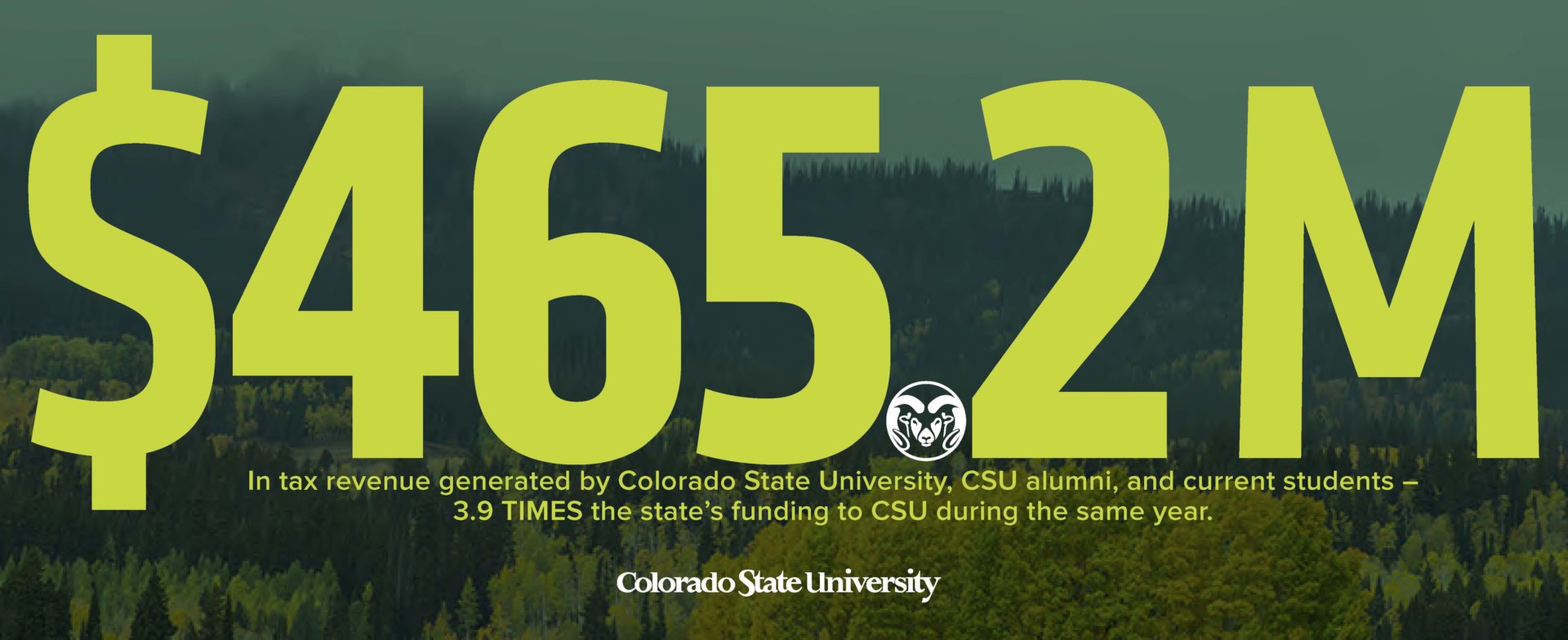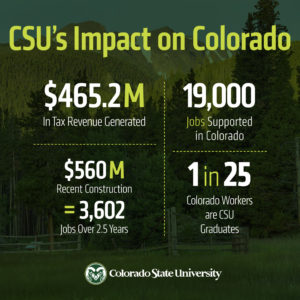
Colorado State University, along with its students, faculty, staff, and alumni, contributed more than $460 million in tax revenues to the state of Colorado during a year-long period, while also helping create 19,000 jobs in the state, and spawning dozens of new startup companies through its world-leading research programs.
All told, this $465.2 million contribution to the state’s bottom line during 2015 was nearly four times the amount of funding the state of Colorado provided to the university during the same year. In addition, six of the largest projects that were part of the recent construction boom on campus sparked $560 million in new economic activity, creating the equivalent of 3,602 yearly jobs that persisted during a 2.5-year period.
These are among the findings of two new studies of the economic and fiscal impact of CSU, and of recent campus construction projects.
Two economic impact studies
The two studies are the result of in-depth analysis commissioned by the University to better understand CSU’s economic footprint on the state. The studies were carried out jointly by lead author Rebecca Hill, Ph.D., an agricultural and resource economist in CSU’s College of Agricultural Sciences, and co-authors Harvey Cutler and Martin Shields, both professors and economists in CSU’s College of Liberal Arts.
“Simply put, CSU is one of the state’s most important economic growth engines and a cornerstone of Colorado’s economic future,” the authors conclude.
 “This in-depth study by Drs. Hill, Cutler and Shields reinforces that Colorado State University, as a major research university, is a key driver of Colorado’s economy, with a statewide impact,” said Tony Frank, president of Colorado State University in Fort Collins and chancellor of the CSU System. “CSU – and higher education overall – is a smart investment for the state, and we’re proud to return significant value to Colorado taxpayers.”
“This in-depth study by Drs. Hill, Cutler and Shields reinforces that Colorado State University, as a major research university, is a key driver of Colorado’s economy, with a statewide impact,” said Tony Frank, president of Colorado State University in Fort Collins and chancellor of the CSU System. “CSU – and higher education overall – is a smart investment for the state, and we’re proud to return significant value to Colorado taxpayers.”
Economic and Fiscal Impact Study
The Economic and Fiscal Impact Study: Colorado State University looks at three key areas of impact: higher wages earned by CSU alumni because of their degrees; operational and student spending in the Fort Collins and state economies; and research and innovation at CSU, which strengthens a wide range of Colorado businesses and industries.
The authors developed an economic and fiscal impact model expressly for Colorado that takes into account variables such as age of alumni, and the fact that most would be working at a job of some sort whether they had a degree or not.
“One of the most striking findings was the pervasive impact of the University and its alumni across the state,” Cutler said. “By building a model specifically for the state, we are able to see how CSU not only affects people in Fort Collins, but also contributes to the economy in essentially every Colorado community.”
The full 14-page study is available here.
Of CSU’s overall budget of $1.1 billion, 55 percent is dedicated to payroll, which supports approximately 7,500 workers, most of whom live and work in the Fort Collins area. During the same year, CSU received $119 million in state funding.
Significant findings of the fiscal impact study:
- Earnings by CSU alumni
- The 105,000 CSU alumni were working in every Colorado county and earned an estimated total of $5.54 billion from their jobs in 2015.
- Among workers in Colorado, nearly 1 in 25 has a CSU degree, which significantly boosts their earning power over those who didn’t graduate from college.
- CSU alumni in Colorado collectively earn $2.2 billion more because of their college degrees.
- Jobs created and supported by CSU
- CSU generates an estimated 16,865 jobs in the Fort Collins area, directly and indirectly.
- CSU supports around 19,000 jobs annually in Colorado through spending by CSU and students who come from out of state and the increased business productivity that results from CSU’s research and engagement efforts.
- Business spinoffs and increases in regional productivity stemming from CSU translate into an additional 352 private-sector jobs and $13.5 million in household income to the Fort Collins area economy.
- CSU students not originally from Fort Collins spend $270.4 million dollars a year in the community, and this spending alone supports 2,500 jobs in the Fort Collins area.
- Tax revenue generated by CSU
- CSU and its alumni and current students contributed $465.2 million in tax revenue to Colorado during the study year. This included more than $276 million in Colorado tax revenue generated by CSU alumni, and $188.3 million in individual and corporate state income tax and sales tax revenue generated by University operations and current students. This represents 7 percent of total state tax collections in these categories.
- The Fort Collins area receives about $36 million in local sales and use tax revenues from spending by CSU students and the University.
- Spending by CSU students not from Fort Collins generates $5.8 million in local sales and use tax revenue in Fort Collins. This represents about 3 percent of the city’s sales and use tax revenue.
- Total economic activity related to CSU spending provides Fort Collins with more than $23 million in city sales and use tax revenue, more than 17 percent of the annual total.
“CSU is very important to our local and state economy, and this study helps to illustrate what that impact is,” Hill said. “Of course, the benefits of CSU extend beyond what we found in this report. For example, studies have found that public engagement increases and crime rates drop in places with more college graduates. The impacts from these and other important outcomes are difficult to put a dollar value on.”
The study did not include the $172.3 million in philanthropic funds raised by the University during FY15. Those funds support a broad range of activities, including student scholarships and success initiatives and new facilities for teaching, learning and research. This donor support to CSU surpassed the $119 million in financial support from the state in 2015, the year of the analysis, as it has annually since 2012. Philanthropic support for CSU is higher than at any other campus in the state, and giving to the university topped $190 million in each of the past two years.
Innovation and R&D
The economic and fiscal impact study also finds that CSU is one of Colorado’s leading sources of innovation in a broad range of industry sectors, including agriculture, engineering, biophysics, veterinary medicine, chemistry, atmospheric sciences, and business.
Central to that success is more than $300 million in annual research expenditures at CSU. The study says that generates – along with startup businesses and licensing agreements – $34 million in additional state tax revenue from the university’s innovation, and research and development activities.
CSU-related activities led to:
- the equivalent of 10,425 jobs and $676 million in annual household income
- 49 new patents in 2015, and 200 licensing agreements over the past five years
- 30 new startups in the past five years directly connected to CSU
“As we’re in the day-to-day, we don’t often get the opportunity to pull back and see the macro impact to the state and the city as we work one-on-one through these licenses, technologies and startups,” said Todd Headley, president of CSU Ventures, which supports technology transfer at CSU. “It’s really gratifying to see what the impact is when you look at the broad picture.”
Economic contributions of recent construction projects
Nearly $560 million in expenditures from CSU’s recent construction projects has generated significant jobs and tax revenue that are a boon to Colorado, according to the second study issued by Hill, Cutler and Shields, Economic Contribution of Colorado State University Construction Projects.
The analysis focuses on spending related to six multiyear construction projects at CSU: the chemistry research building, CSU Health and Medical Center, parking garages, Aggie Village, biology building, and the on-campus stadium.
“One important aspect of the construction projects is that they create jobs for a large number of blue-collar workers, who were hard hit by the Great Recession and have seen pretty modest wage growth over the past 15 years,” Shields said. “In addition, these new facilities will continue to generate impact into the future through operations and maintenance, and there may be other economic activity that could happen in these facilities.”
Key findings of the construction impact study:
- Construction of these six projects accounted for nearly $560 million in expenditures.
- The six projects generated $190 million each year in Colorado household income.
- Yearly expenditures equaled $221.6 million over 2.5 years, which translates to the equivalent of 3,602 yearly jobs, which persisted over the 2.5 years.
- The six projects generated $17.6 million in yearly tax revenue to the state of Colorado.
These six projects are among $1.4 billion in renovations and new construction that has transformed CSU’s Fort Collins campus since 2010. The construction study does not take into account the contributions of other CSU capital projects or future contributions to the Colorado economy that could come from the use of the facilities.